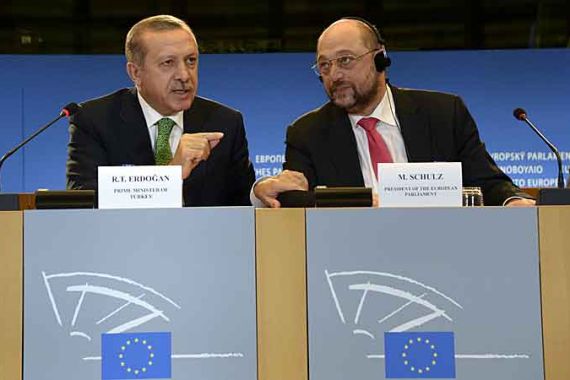Turkish PM faces EU leaders’ criticism
Erdogan, in Brussels for first time in five years to restart EU membership bid, defends purge of police and judges.

Turkey’s prime minister, making his first visit to Brussels in five years, has faced sharp criticism from European Union leaders over a crackdown on the judiciary and police.
Recep Tayyip Erdogan was told by Jose Manuel Barroso, European Commission’s president, in the Belgian capital on Tuesday that respect for rule of law and independence of the judiciary were basic principles of democracy and essential conditions for EU membership.
“Whatever the problems are, we believe that the solution for those problems should respect the principles of rule of law and separation of powers,” Barroso said.
Erdogan has purged hundreds of police and moved to impose tighter control on the courts in response to a corruption inquiry that has rocked his governing AK Party, which has Islamist roots and has been in power for more than a decade.
The crackdown has affected ties with the EU just at a time when Turkey’s long-stalled bid to join the 28-nation bloc had appeared to be regaining some momentum.
EU leaders said they had told Erdogan of their concerns.
“It is important not to backtrack on achievements and to ensure that the judiciary is able to function without discrimination or preference,” Herman Van Rompuy, European Council president, said.
Erdogan has cast the corruption inquiry, which has led to the resignation of three ministers and detention of businessmen close to the government, as an attempt by a US-based Muslim leader with influence in the police and judiciary to unseat him.
New dismissals
Even as Erdogan met European officials in Brussels, his government launched another wave of dismissals of judges and prosecutors.
A panel headed by the justice minister said in a statement on its website late on Tuesday that the government had removed 96 more judges and prosecutors from their posts on Tuesday.
They included a judge who heard the “Sledgehammer case” in which top retired military officers were convicted for leading an alleged plot to overthrow Erdogan’s government a decade ago.
Also, an AK Party draft bill that would give government greater control over the composition of Turkey’s highest judicial body, the Supreme Board of Judges and Prosecutors (HSYK), has raised particular alarm in Brussels.
Erdogan indicated on Tuesday the bill was being revised to accommodate EU concerns.
“The judiciary should not go beyond its defined mission and mandate,” he said.
“This is what we’re doing. Anything else is misinformation and disinformation.
“Certain recommendations have been made by our European friends and we have taken them into account.”
Erdogan made the remarks after what was described by all sides as “a lively debate” on the draft judicial reform legislation with European legislators.
“Other modifications possibly will be made,” he said. “But the law must come into force as quickly as possible.”
Erdogan, who often responds forcefully to criticism, scolded EU leaders for raising the dispute in public, but generally struck a subdued note.
“Instead of communicating this [criticism] through the media, we should handle this in our bilateral talks through our relevant ministers,” he said.
‘Judicial rule’
Erdogan said judges operated within a democracy and this meant limits on their power.
“If we consider the judiciary as a separate power, then this would lead to a country of judicial rule and not democracy,” he said.
Turkey’s decades-old drive to join the EU gained traction late last year when the country and the EU opened talks on a new policy area of the membership negotiations.
Erdogan said the EU membership talks were on the right track for now, though he repeated a threat he has made before that Turkey might “end up turning in other directions” if the negotiations did not achieve results.
He did not elaborate.
Despite his criticism of the crackdown, Barroso said he believed Turkey would swiftly address the EU’s concerns.
Turkey began negotiations to join the EU in 2005, 18 years after applying.
However, a series of political obstacles, notably over the divided island of Cyprus, and resistance to Turkish membership in Germany and France, have slowed progress.
The Turkish lira currency hit a new record low against the dollar on Tuesday after the central bank left interest rates unchanged.